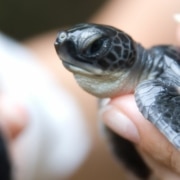6 August 2021
The United Nations’ 17 Sustainable Development Goals (SDGs) to protect the planet, tackle poverty, and bring about peace and prosperity are supposed to be achieved by 2030. But they take little notice of the problem of plastic soup.
While scientists now recognise plastic pollution as a planetary boundary, the problem of plastic is hardly included in the framework of the SDGs. This is leading to three problems.
1: THE PLASTIC SOUP HARDLY APPEARS IN THE SDGs
In 2015, the United Nations launched the well-known 17 Sustainable Development Goals. None of these goals has plastic soup as its main subject. Only SDG 14 (Life below water) explicitly refers to plastic pollution. In total, 169 sub-goals jointly form an action plan to achieve the SDGs. Sub-goal 14.1.1 states that the reduction in plastic in the ocean will be measured by an indicator of the density of floating plastic debris.
But the stated indicator does not exist, says the environmental bureau of the United Nations in a report. This means that no one can determine if this sub-goal is achieved and the goal is in fact a non-starter.
2: PLASTIC SOUP STANDS IN THE WAY OF ACHIEVING THE SDGs
Plastic pollution is standing in the way of achieving at least 12 of the 17 sustainability goals. This was made clear in an article that appeared this month in Current Opinion in Green and Sustainable Chemistry. In the case of plastic soup, it is not only about floating plastic in the ocean (SDG 14), but about a lot more. To take a few examples from the article:
- SDG 1 (end poverty). Plastic waste keeps poverty going as plastic is a breeding ground for insects thereby causing diseases such as malaria. Local coastal communities have to spend a lot of money to clear up washed up plastic.
- SDG 3 (good health and well-being). We ingest plastic through food, drink and the air without knowing its long-term effects.
- SDG 6 (water and sanitation). Activities such as machine washing synthetic clothing releases microfibres into the environment and into drinking water.
- SDG 15 (life on land). Microplastics negatively affect ecosystems, not only in the water but on land too.
The SDG framework does not include any indicators that determine the negative effects of plastic pollution on each individual goal. It is as if plastic pollution is totally irrelevant and there are no relationships between plastic and the goals.
3: THE PLASTIC SOUP IS MAINTAINED BY COMPANIES WHO EMBRACE THE SDGs
There is a third problem that arises from the minimal attention paid to plastic soup in relation to the SDGs. Multinational corporations with huge interests in plastic are embracing all the SDGs without exception. And it is easy for them to do so as there are no goals or sub-goals that have indicators to map the reduction in plastic pollution. They do not need to justify their roles whatsoever in having created the plastic soup and in keeping it going. Companies that are largely responsible can simply continue their activities while at the same time boast about embracing the SDGs. Whether these are multinationals that are producing new plastic (like Shell), finance the production of plastic (like ING), or use plastic in single-use packaging (like Unilever), this is a recurring problem.
You may also be interested in:





